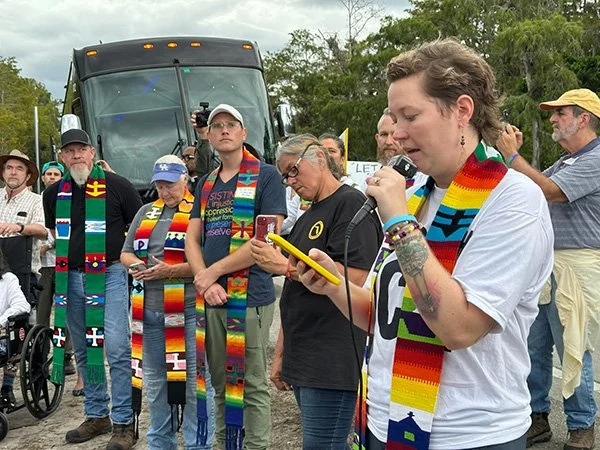Organizing Vigils at Detention Centers: A Call to Witness and Action
By Cameron Helwege, MFSA Communications Coordinator
A large, diverse crowd turned out for an Aug. 17 prayer vigil at Alligator Alcatraz, an immigration detention center erected in the Everglades. (Photo courtesy of Rev. Andy Oliver)
On Sundays in August, hundreds of people of faith gathered at the gates of Florida’s new detention facility, known by many as “Alligator Alcatraz.” Located deep in the Everglades, the site was built hastily on an abandoned airstrip and now cages hundreds of immigrants in inhumane conditions. Reports of broken toilets, moldy food, and sweltering tents make it clear: this is a moral crisis.
Leaders of different faiths stand together near US-41 across the street from the gates of “Alligator Alcatraz”
Faith leaders in close partnership with Florida Immigrant Coalition and the Miccosukee Tribe joined together for five consecutive Sundays, standing in a small clearing on the side of US 41 outside the entrance of the facility for prayer, testimony, and lament. Their message was simple: no one belongs in cages. Over 280 people attended the August 17 vigil, arriving by bus and carpool from churches and community groups across the state. Diverse voices—Jewish, Muslim, Christian, Indigenous, and people of moral conscience—lifted prayers and poems, refusing to look away from the injustice happening just across the street.
But this story is bigger than Florida. Detention centers like this one exist across the country, and in every case, they are places where immigrants—many fleeing violence, poverty, or disaster—are stripped of dignity, locked away without due process, and too often denied access to legal aid. Behind the fences and razor wire, families are torn apart and human beings are warehoused as a matter of policy emboldened by authoritarian leaders who see immigrant lives as disposable.
Rev. Brittany Leclair of First UMC Pinellas Park speaks at the vigil outside of the detention camp known as “Alligator Alcatraz”
By gathering publicly, we shine a light on what those in power want hidden. We remind one another that love crosses borders, that solidarity is stronger than fear, and that cages will not have the last word.What is happening in Florida can serve as a model for a broader justice-seeking movement. Vigils at detention centers are a way for people of faith and conscience to bear public witness, to disrupt the narrative of fear, and to stand alongside immigrant communities who demand freedom.
Expand
People of faith and conscience gathered Aug. 17 outside "Alligator Alcatraz" to protest the hastily built, environmentally unsound and physically dangerous immigration detention center. (Photo Courtesy of MFSA)
How to Organize Something Similar
If there is a detention center in your region, consider gathering your community in witness and protest. The Florida vigils offer a template:
Florida's organizers have been holding vigil from 5-6 PM and have been encouraging others to use the same time slot for solidarity.
Make travel accessible. Organize buses and carpools to lower the barrier for participation.
Prioritize safety. Enlist volunteer medics and train safety marshals.
Connect with local leadership. Partner with people who know the land and community. In Florida, faith leaders worked alongside members of the Miccosukee Tribe.
Stay peaceful. Do not engage with hecklers or opposition; the focus is on witness, not confrontation.
Create solidarity opportunities. If you are too far from a detention center, host a vigil outside a local courthouse, city hall, or church to align in spirit with those at the gates.
A Framework for these Vigils
Each vigil is different, but a basic flow can include:
Opening Gathering: Words of welcome and a moment of silence for those harmed in detention.
Invocation: Short prayers or readings from diverse traditions (Jewish, Christian, Muslim, Indigenous, secular, etc.).
Song or Chant: Simple, repeatable songs like We Are a Gentle Angry People or We Shall Overcome.
Testimonies: Stories from those directly impacted, alongside reflections from faith leaders.
Litany of Lament and Hope: Call-and-response naming the cruelty of detention and the hope for liberation.
Closing Blessing: Leaders from multiple traditions offer short blessings for strength, courage, and freedom.
People from Allendale United Methodist Church in St. Petersburg, Florida gather outside of the detention camp known as “Alligator Alcatraz” in the Florida Everglades
Take the Next Step
The invitation is clear: if there is a detention center in your area, you can organize too. Whether you bring ten people or two hundred, whether you stand at the gates of a facility or hold a solidarity vigil miles away, your presence matters. Together, our collective voices can declare that love will not be detained, and that every human being is worthy of safety, freedom, and belonging.
You may have heard the recent news that “Alligator Alcatraz” has been ordered to shut down. The vigils will continue until every cage is empty, and when that happens, faith leaders in Florida will continue holding vigil at other detention camps around the state.
Interested in Connecting on Vigils, Contact Noelle Damico, Director of Social Justice NDamico@circle.org



